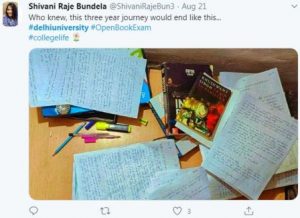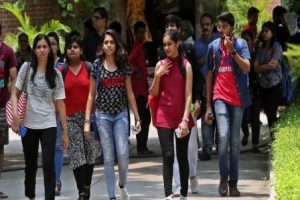Delhi University and its Many Failures during the Pandemic
Lakhs of students will suffer the consequence of this incompetence in the wake of the pandemic. There is a need for concrete laws that protect their interests.
The Delhi University (DU) finally began its online open book examination (OBE) on 10 August. However, criticism has only grown with the OBE. Amid a global pandemic and the consequent disruption of daily life, students have been one of the worst hit populations all over the world. This promptly led educational  institutions to adopt an unconventional mode of teaching—online classes. In India, one of its biggest shortcomings has been its inaccessibility to a vast majority of the student population. In most cases, students and their families cannot afford the technology, the infrastructure and the resources, or it is simply not available where they live. A recent survey established that about 60 per cent of the Indian population do not own a smartphone (read cannot afford). The online mode, therefore, is a luxury that many cannot afford or avail. The plight of DU students is no different. A survey conducted by the Delhi University Teachers’ Association (DUTA) in May showed that only an average of 27.8 per cent students could attend 50 per cent of the online classes and a staggering 33.7 per cent could not attend the classes due to a combination of factors—no laptop or smartphone, no internet or weak internet, technical glitches and/or a non-conducive home environment. The DU’s decision to pass the intermediate semesters on the basis of their internal assessment marks and hold online OBE for the terminal semesters of all Bachelors and Masters programmes in its regular colleges as well as its School of Open Learning (SOL) and Non Collegiate Women’s Education Board (NCWEB) has received intense criticism and opposition from its students and teaching community. In the semester system, all semesters are created equal and the CGPA awarded to the students are the average of all semesters combined. The last semester is not the most important semester as university authorities seem to believe. Most importantly, not all students have the resources or the facilities to give an online exam. An overwhelming 85 per cent of students opposed the OBE, according to the DUTA survey.
institutions to adopt an unconventional mode of teaching—online classes. In India, one of its biggest shortcomings has been its inaccessibility to a vast majority of the student population. In most cases, students and their families cannot afford the technology, the infrastructure and the resources, or it is simply not available where they live. A recent survey established that about 60 per cent of the Indian population do not own a smartphone (read cannot afford). The online mode, therefore, is a luxury that many cannot afford or avail. The plight of DU students is no different. A survey conducted by the Delhi University Teachers’ Association (DUTA) in May showed that only an average of 27.8 per cent students could attend 50 per cent of the online classes and a staggering 33.7 per cent could not attend the classes due to a combination of factors—no laptop or smartphone, no internet or weak internet, technical glitches and/or a non-conducive home environment. The DU’s decision to pass the intermediate semesters on the basis of their internal assessment marks and hold online OBE for the terminal semesters of all Bachelors and Masters programmes in its regular colleges as well as its School of Open Learning (SOL) and Non Collegiate Women’s Education Board (NCWEB) has received intense criticism and opposition from its students and teaching community. In the semester system, all semesters are created equal and the CGPA awarded to the students are the average of all semesters combined. The last semester is not the most important semester as university authorities seem to believe. Most importantly, not all students have the resources or the facilities to give an online exam. An overwhelming 85 per cent of students opposed the OBE, according to the DUTA survey.
Most of them returned to their homes because of the pandemic. Travelling to the city when the pandemic is reaching a peak is unthinkable.
Also Read : Online Education during COVID-19: Dividing the Divided
Each year, lakhs of students from all over the country come to the National Capital Region (NCR) for a chance to study in DU. DU is a safe haven for students to learn, interact with some of the country’s best and avail opportunities that are not available anywhere else. Its advocacy for inclusivity makes it possible for students from diverse backgrounds to study here. According to reports, 50 per cent of its students belong to the SC, ST and OBC categories from all over the country.
The availability of electricity and good internet connectivity that the city offers is deemed a luxury in most parts of India that these students come from.
Ignoring this and going ahead with the exams are discriminatory to say the least, and thus is the OBE’s unpopularity. With the exams underway, students have complained about the issues they are constantly facing. Underprepared and receiving no counselling on how to write an OBE, many have resorted to copying down copious amounts of notes made from whatever study material is available to them. Some students had to plan the exam days ahead, making sure that batteries wouldn’t die in the middle of an exam or staying over at a friend’s or relative’s place with better electricity and internet connectivity. Sometimes this involved travelling to the nearest town and writing exams in cyber cafes. The biggest worry is not writing the exam, but uploading it. The uploading process involves taking picture of each page of the answer sheet and scanning them, compressing them to the required size and uploading them. A single page sometimes takes a good many minutes to be scanned and compressed. Multiply that by 30-40 pages. Multiply the frustration too. The balance hangs on having a good enough smart phone, electricity, internet connectivity and no technical glitches on DU’s part. DU did make more than its fair share of mistakes. There are reports of a department forgetting to register itself for the online exams making students wait, while they worked on the issue. Questions were uploaded before the exam or half an hour into the exam, uploading the wrong questions being some of them. DU’s server crashed everyday of the exam. On one occasion, when even the varsity’s email crashed during paper submission, a nodal officer asked students to mail the university their grievances. Reports of students openly cheating in their WhatsApp groups with some being pressured to share answer scripts in the name of friendship have also surfaced.
 The Delhi High Court noted that 50 per cent of the students are not taking the online exams and has directed the university to conduct the offline exams soon. DU has announced that offline exams will commence from 20 September. This does not clear the mess DU has made of the issue. In fact, it makes it messier. Now there are questions of if it will be possible to declare the OBE results before the offline exams so that those dissatisfied with their OBE results can retake their exams in the offline mode. Also, how will the varsity resolve the question of the different yardsticks for the two modes and streamline them to a common marking system. It is safe to assume that the students who didn’t give the online exams don’t have the resources for it. This includes the students belonging to the EWS, ST, SC, OBC and PWD categories. Most times, these categories overlap and intersect with the geographically marginalised regions like the North East and Kashmir. For them, the offline mode is not feasible either. About half of DU’s student population is from outside Delhi.
The Delhi High Court noted that 50 per cent of the students are not taking the online exams and has directed the university to conduct the offline exams soon. DU has announced that offline exams will commence from 20 September. This does not clear the mess DU has made of the issue. In fact, it makes it messier. Now there are questions of if it will be possible to declare the OBE results before the offline exams so that those dissatisfied with their OBE results can retake their exams in the offline mode. Also, how will the varsity resolve the question of the different yardsticks for the two modes and streamline them to a common marking system. It is safe to assume that the students who didn’t give the online exams don’t have the resources for it. This includes the students belonging to the EWS, ST, SC, OBC and PWD categories. Most times, these categories overlap and intersect with the geographically marginalised regions like the North East and Kashmir. For them, the offline mode is not feasible either. About half of DU’s student population is from outside Delhi.
Also Read : Revitalising Yamuna in Delhi: Connecting with the People who matter
Every intra and interstate travel requires a 14 -day quarantine. Additionally, the paying guests (PGs), rents and hostels won’t want to let back the students at this time. It is financially limiting too. Presently, if students decide to forego the exams in order to avoid the risk to their lives and that of their families and because of financial limitations; the decision will seem like a folly after the pandemic ends and the desperation for a job grows because of the worsening economic conditions. We are bound to see a rise in mental health issues among the student community in the next few months.
DU has let its students down. None of its decisions justify its claims of upholding the interests of the students or maintaining the sanctity and standards of examination. Now due to no fault of theirs, some students will get their degrees later than their classmates or will not get them at all this year; robbing them of equal opportunities and creating inequality based on circumstances and socio-economic divides. All because the university could not respond to the challenge thrown by the pandemic in a more resourceful and creative way. Citing desperate measures for desperate times, they have forced students to meekly comply for the worse. If the university goofs this up, can students ask for a redressal? Lakhs of students will suffer the consequence of this incompetence in the wake of the pandemic. There is a need for concrete laws that protect their interests. After all, they are the highest stakeholders of the institution, and ultimately of the nation’s future.
